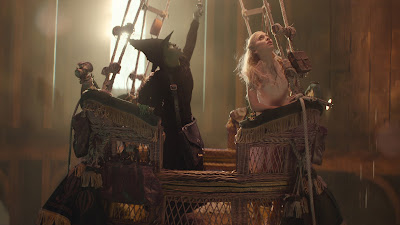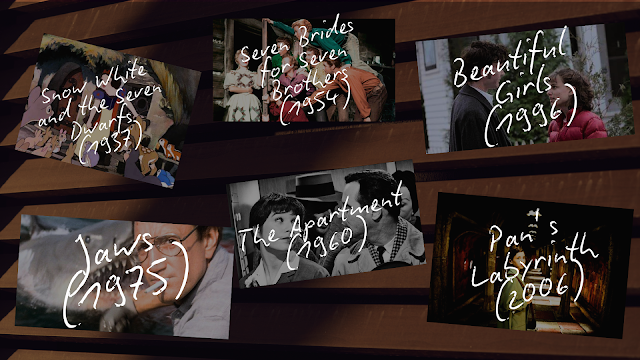Let me start this party by admitting ... I really dropped the ball on reviews this year, folks. Not counting my Percy Jackson response, which in practice plays more like one of my essays anyways, there was a six-month gap between reviews with Wish last November and The Fall Guy this May.
More than once during that drought, I took my notebook to the theater and came back with a page full of notes, but for various reasons I was unable to piece together anything. It didn't help also that deliveries this year were comparatively sparse, what with the strikes strangling the production line ... I will try to do better this year. (For those curious, I am also going to try to review the final season of Stranger Things, like I did with the 4th season, when it drops sometime this year. That will all depend on a lot of things, including the method by which Netflix chooses to release these episodes.)
My reviews didn't particularly favor many of the box office hits this year--you'll all have to wait before you hear my opinion on Twisters, I guess--but I do try to remain at least plugged into the pop culture discourse. After all, aside from the "Percy Jackson" show response, my biggest review was for the Wicked film adaptation.
No surprise. I had a lot invested in the success of this movie, not just as a fan of the property, but as a champion of the musical genre. My musical survey essay nearly two years ago was largely in anticipation of this film, which I knew would be a turning point for studios deciding whether or not they were going to keep throwing money at this trickiest of genres. The financial and critical success of this project, then, gives me hope that musicals might live to fight another day, and I eagerly look forward to reviewing Wicked's concluding installment this Thanksgiving.
The essay round-up this year includes:
-Reveling in the Mixed Messages of Miss Congeniality - A thematic dissection of Miss Congeniality and its seemingly contradictory representation of gender dynamics.
-The Banshees of Inisherin: The Death Knell of Male Friendship - A look at The Banshees of Inisherin as a reflection the complexities in maintaining adult male friendship.
-Finding Nemo: The Thing About Film Criticism ... - A deep-dive into the mechanics of Pixar masterpiece, Finding Nemo, and what it means for the critical attitudes toward film as a whole and animation specifically.
-Nights of Cabiria: What IS Cinema? - A meditation on the function and purpose of the cinematic form as reflected in the 1957 Italian film, Nights of Cabiria.
-The Other Woman: Empathy isn't Easy - An exercise in understanding character likeability as seen in the 2009 independent film, The Other Woman with Natalie Portman.
-We Did Not Deserve The Lion King - A history of the production of Disney's The Lion King and a look at its unusual place within the Disney canon.
-How Guardians of the Galaxy Tricks You into Feeling Things - A retrospective of the intricate emotional dialogue underpinning James Gunn's Guardians of the Galaxy trilogy.
-The Power of the Dog doesn't (want to) Understand Toxic Masculinity: A History and Deconstruction of the Toxic Cowboy - ... this one's pretty self-explanatory.
-A Patch of Blue: Sidney Poitier, Representation, and the Virtue of Choice - A tribute to actor and activist, Sidney Poitier, seen through the lens of his best film, A Patch of Blue.
-Children of a Lesser God: Between Sound and Silence - A look at the landmark film in deaf representation, including its historic win for Best Leading Actress from deaf performer, Marlee Matlin.
-My Best Friend's Wedding: Deconstructing the Deconstructive Rom-Com - An exploration of the post-modern attitudes toward the rom-com genre at work in My Best Friend's Wedding.
Identifying which movies are going to earn the spotlight this time around is always half the battle, not because I am lacking for movies I feel strongly about, but because I'm always trying to decide how best to distribute my promotion across branches of the film tree that deserve it most. I'm trying to make it a regular feature to rope in discussion on movies that don't have a lot of coverage. Ideally, indie-films that didn't receive any Oscar noms.
 |
| Scarlet Street (1945) |
Additionally, I'm becoming more interested in discussing films that I think are interesting but not necessarily masterworks. Somewhere between a rave and a rant. Something like my Clash of the Titans essay a few years back. There's tremendous catharsis in writing about something on either end of the spectrum, but to do away with extremes and dial in on the intricacies of a film's delivery, that demands a very refined analytical ability. Learning to deal in the gray, in the nuance, is a key to vivid discourse. Moreover, the film discussion doesn't just live or die on the highest and lowest points. Lots of films deserve discussion.
I call it a battle to identify viable candidates, but that's generally describing the amount of brain power demanded, not the timeline by which it occurs: by mid-January of last year, I had already figured out almost every single essay I was going to write in 2024.
 |
| I had a lot of time to prep my "Thor" essay |
I have historically, for example, been very coy about promoting my work too far in advance in order to sidestep any awkwardness that might come up if I end up having to drop a piece in production (that has happened before) that I have already publicly committed to. But this kind of thing has been very rare, which has me wondering if this practice has been so useful after all and has also inspired me to try something new this year.
Knowing that, help yourself to this peek at some highly classified information.
This is also a year I've given extra thought to what a critic's job even is.
As best as I can put it, a critic ought to be someone who opens your eyes. This should be someone with a good knowledge of the medium's history and linguistics--someone who can actually tell you whether or not what a film is trying to do is novel or even noteworthy. Films are a reflection of life and the cornucopia of worldviews and perspectives that can find their way onscreen, and so ideally your critic knows a thing or two about that as well.
And the goal of criticism isn't necessarily consensus. We all bring our own values and perspective to the game. As a result, two equally qualified critics can have two conflicting reads of the same piece of media--that's part of the fun. The secret of criticism is that you don't actually have to convince anyone to change their colors. You just have to get them see new ones. I really respect film critics who pull that off.
 |
| Modern Criticism ... |
Advances like Rotten Tomatoes scores and IMDb's rating system have also shaped the landscape. The goal of the critic becomes to anticipate where the movie's going to land and tailor your review in advance so you're not caught on the wrong end of the YouTube comments. I'm not here to bag on those sites--I especially find a lot of IMDb's features useful for both assembling my writing and my own personal uses as a casual film fan. I just think it's worth reflecting on how the ability to immediately assign a film a numerical value impacts the way films are discussed, and also whether or not there's anything proactive film lovers can do to keep audiences on their toes.
The challenges that face thoughtful film discussion have maybe never been easy, but I also don't think that contemporary film lovers ought to take that as an excuse to shirk from our responsibility to keep the conversation not just alive, but healthy as well.
--The Professor






Comments
Post a Comment